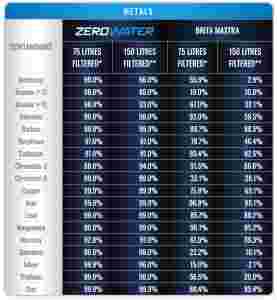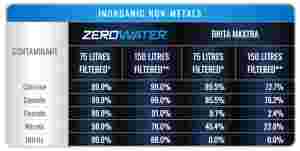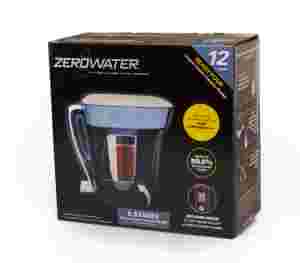We were delighted to be offered the opportunity to review Zerowater filter for use in the home or office (to immediately order one, order your Zerowater purifier here). Here is what we found…
Tap water quality varies across the Country, indeed the World over. Often, when on holiday in the UK, I find the tap water just isn’t to my taste and end up either adding flavourings or buying bottled water, looking forward to my first decent cup of tea on my return home.
However, using water filtered through Zerowater, I found the water produced a much nicer cup of tea and I could enjoy a glass of water throughout the day. And, it has a handy tap beneath the handle, so no need to lift and pour from the jug.

All was not fantastic, the Zerowater filter is simply too large to store in my fridge, therefore, the only way to enjoy a cold glass of water was to add ice (yes, I used the filter water to make ice too). I also decanted the filtered water into glass bottles to store in the fridge : life saver. Was it worth the faff? It certainly was, particularly when away from home where the water quality maybe isn’t so good.
Here in Wales, our water isn’t too bad at all. I took the readings using the TDS (Total Dissolved Solids) reader that came with the Zerowater filter, my before reading was 44-45 but after running through the filter my reading was 3 : yes, it should be 0 but I suspect it is almost impossible to clean the Zerowater filter and put everything together without leaving some contaminates behind. Subsequently doing more tests in the week following the initial review, we are now getting a reading of 0 (zero!). May have taken a few passes before the filters really kicked in properly.
TDS, The Science Definition:
Total Dissolved Solids (TDS) are a measurement of compounds like minerals, salts, and organic compounds that are dissolved into the water through contact with rock and other surfaces. TDS can be made up of several different compounds (including but not limited to): calcium, magnesium, iron, sodium chloride, and sulphides (which are compounds frequently found in groundwater supplies). Increased levels of TDS (total dissolved solids) may affect the taste and appearance of your water.
Why Should You Measure TDS?
Measuring water TDS levels is the best way to understand the quality of your drinking water. Total Dissolved Solids are organic and non-organic sediments found in water, which contribute to a difference in the taste, odour, and appearance of water. Dissolved solids enter your water supply from a wide range of sources — old piping, run-off from road salts, pesticides, fertilizers, and more.
What is the TDS Water Test?
TDS is tested in water through special meters that detect particles. A ZeroWater® TDS meter will show the number of solid particles per one million water particles (ppm). For example, a value of 60 ppm means that from one million particles there are 60 dissolved ions, and the rest (999,940) are water molecules. 5-Stage water filters by ZeroWater® remove 99.6% of total dissolved solids in your drinking water. See what Zerowater removes below:


Zerowater also claim it can turn red wine into water (I know, who would right) but you can watch this YouTube clip of Philip Schofield showing you how.
The official bit…
It comes with a TDS (Total Dissolved Solids) reader so you can test your tap water before and after use. Some areas in the UK have water as poor as 300 on the TDS meter, when you use Zerowater it lowers the score to 0.
Tap water isn’t as appealing as we all wish, that is until Zerowater came along. Now you can save money and help reduce single-use plastic waster by drinking tap water. Zerowater is a premium filter and reduces 99.6% of all total dissolved solids that are found in your drinking water. It delivers the purest tasting water in minutes. So good you can see straight through, no more limescale and other pollutants. Zerowater removes twice as many solids from tap water as leading filter brands in the UK. Zerowater removes 97% of lead, 96% of mercury, 95% of chlorine, and much more.
Zerowater is so powerful that on average it removes 95% of all metals compared to 68% from Brita. Zerowater even removes 68% of all inorganics, whilst 33% is removed from Brita. The full list can be found here.
Whilst premium bottled water looks glamorous coming from the top of snowy mountains, the carbon footprint is shocking, and micro-plastics enter the water from the bottle itself. Finally, single-use plastics often end up in our oceans and landfill, despite the best intentions of the users. Zerowater makes tap water taste great and turning on the tap never felt so good. Better for you, your pocket, and the Environment.
What makes Zerowater different?
- Technology : Zerowater’s 5 stage advanced filtration is very different from traditional carbon-based 2-stage filters.
- It works harder : it may filter slower as the 5-stage technology works harder to remove more impurities from your tap water.
- Maintenance : Zerowater filters may need to be replaced more often, depending on the quality of your tap water.
- Removes 18,000 MG of impurities : while completely safe, you may notice a citrusy smell or taste upon filter exhaustion. Filters should be replaced at this time and not used any longer.
- Water quality : getting the purest tasting 5-stage filtered tap water may cost more, but it’s worth it.
Find more information and order direct online with Amazon here – order your Zerowater purifier here


















